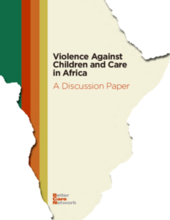While at least 50% of children between the ages of 2 and 17 years experienced one or more forms of violence across Africa in the past year, removing children from family care often fails to end their experience of violence. The best way for governments in Africa to ensure a safer, healthier life for children is to prevent the causes of family separation, and, when that is unavoidable, to ensure the standards for alternative care are the highest possible.
To date, initiatives to address VAC and to reform alternative care systems have not been explicitly or directly linked in policy and programming. Consequently, family strengthening interventions are often lacking coordination and missing important areas of synergies. VAC and care programs “work independently of each other…they are distinctly labelled as such [as a VAC or alternative care initiative], and there has been little merging of approaches to date.”
This discussion paper, developed following the Africa Expert Consultation on Violence against Children in All Care Settings, explores the interlinkages between VAC and children’s care in the African context, including in legal and policy frameworks, data collection and use for decision making, service delivery, and public awareness to ensure families can be supported and empowered to provide protective, stable, and appropriate care for children. The paper will do this by:
- Presenting the evidence from Africa about VAC in the family to highlight how violence is a key contributing factor to family separation and placement of children in alternative care.
- Discussing VAC in various forms of alternative care in Africa, as well as VAC after care, to inform and instigate strategic action to address it.
- Highlighting the gaps in knowledge and interventions that need to be addressed to ensure a stronger coordinated and multisectoral response to realise children’s rights to care and protection.
This discussion paper is divided into four main sections:
- Background, including an overview of the evidence on VAC in the African region, regional and international frameworks related to prevention and response to VAC, and the provision of alternative care.
- VAC in different care settings, including a discussion of VAC in the home as a push factor for family separation and removal of children into formal care, VAC in alternative care, and the different types of violence facing care-leavers.
- Considerations for policies, programs, and other interventions to ensure a coordinated approach between the VAC and care sectors to address violence in all care settings, strengthen family care, prevent unnecessary family separation, and support family reintegration or placement in family based alternative care.
- Key findings and recommendations, including how the existing evidence base, as well as identified gaps in data and research on VAC and care in Africa can be utilized to help inform critical and coordinated actions at the continental, regional and national levels through the legal and policy framework; service delivery, training and supporting all levels of the social service workforce; and increasing public awareness and engagement at levels in efforts to addressing both prevention and response of VAC within all forms of care.
Key findings and recommendations expressed in this discussion paper are also highlighted in this infographic and policy brief.


